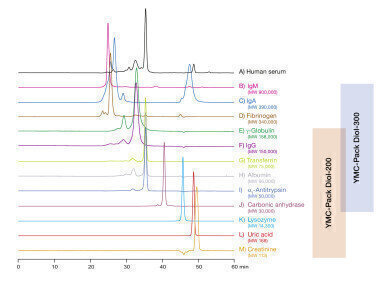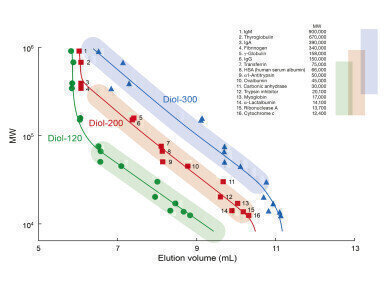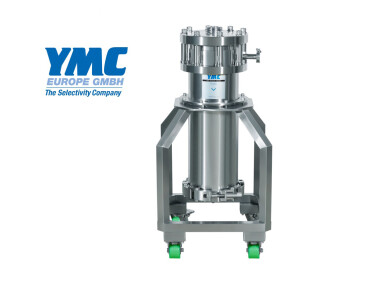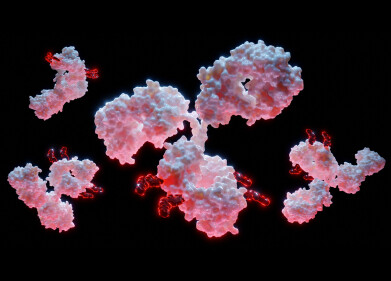-
 Figure 2: Analysis of plasma constituents by coupling two columns: YMC-Pack Diol-300 and YMC-Pack Diol-200.
Figure 2: Analysis of plasma constituents by coupling two columns: YMC-Pack Diol-300 and YMC-Pack Diol-200. -
 Figure 1: Calibration curves of YMC-Pack Diol-120, YMC-Pack Diol-200 and YMC-Pack Diol-300 for analytes with a molecular weight ranging between 12,400 and 900,000 Da.
Figure 1: Calibration curves of YMC-Pack Diol-120, YMC-Pack Diol-200 and YMC-Pack Diol-300 for analytes with a molecular weight ranging between 12,400 and 900,000 Da.
Columns (LC)
Maximising the Separation Capacity in SEC by Coupling Two YMC-Pack Diol Columns
Mar 22 2022
Size exclusion chromatography (SEC) separates analytes based on their hydrodynamic radius. However, since the hydrodynamic radius is related to the molecular weight (MW) of the analyte (assuming that the analyte has a globular shape) in many cases, the analyte’s MW can be considered to be the separation parameter. Therefore, the pore size of a stationary phase plays a key role in SEC. It determines a range over which the analytes’ molecular weight is separated by SEC. If the pore size is too small, the analyte is excluded from the pores and elutes without retention. Conversely, if the pore size is too large, the analyte diffuses throughout the pore and elutes with the same elution volume as other low MW analytes. The first figure shows the calibration curves for three YMC-Pack Diol SEC columns with different pore sizes. This clearly shows the correlation: by increasing the pore size of the stationary phase, the resolution improves for higher MW analytes and increases for smaller MW analytes with reduction in pore size.
Restrictions in use of a single SEC column
Whilst the use of only one column brings a certain limitation due to its dedicated pore size and a limited column volume. However, by coupling two columns with different pore sizes this hurdle can be overcome. Whilst the separation volume is increased by use of two columns, the molecular weight range can be extended by using two different pore size ranges. Both contribute positively to maximising the separation capacity.
More information by coupling of two columns
In the second figure, the analysis of plasma constituents with two coupled columns is shown as an example. By coupling a YMC-Pack Diol-300 with 300 Å and a YMC-Pack Diol-200 column with a pore size of 200 Å, a much broader molecular weight range can be analysed compared to that using only one column. And doubling the column length (2 x 300 mm) results in improved resolution of peaks, covering a range from <1 kDa to 900 kDa.
YMC SEC columns are available with 5 different pore sizes and with particle sizes of 2, 3 and 5 µm. They are based on inert silica and apply a diol modification for minimum secondary interactions.
Events
Apr 22 2025 Kintex, South Korea
Analytica Anacon India & IndiaLabExpo
Apr 23 2025 Mumbai, India
Apr 27 2025 Portland, OR, USA
May 11 2025 Vienna, Austria
May 18 2025 Tempe. AZ, USA













